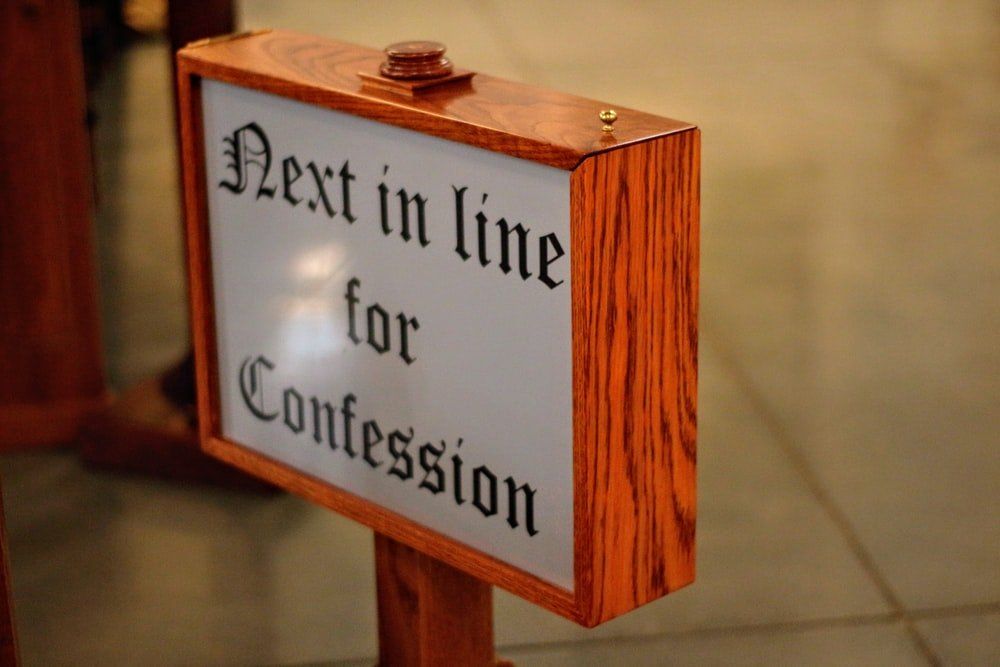Confession liberates us from sins that trouble our hearts and makes it possible to be reconciled to God and others. We are asked to look into our souls and, with an honest and unblinking gaze, identify our sins. This opens our minds and hearts to God, moves us toward communion with the Church, and offers us a new future. (United States Catholic Catechism for Adults)
There are various types of examinations of conscience but regardless of which one you use to prepare yourself for the Sacrament it should be rooted in Scripture. The examination of conscience described below is based on the Ten Commandments.
Once you are prepared to receive the Sacrament, the "Seven Steps to Make a Good Confession" will help you to fully participate in the Sacrament and feel the joy of God's forgiveness and mercy.
Please refer to the Home page for our confession schedule. Confession is also available by appointment by calling the parish office at 864 489-9453.
In addition to the information below, the United States Conference of Catholic Bishops website includes various types of examinations of conscience including those for children and young adults.
Examination of Conscience Based on the Ten Commandments
1. I am the Lord your God. You shall not have strange gods before me.
Do I always put God first? Before my friends? My family? My schoolwork and activities? Do I believe that God really loves me? Do I have any "strange gods" in my life like popularity, sports, entertainment, possessions? Do I trust that God is in control of everything? Do I pray every day? Do I always put God first? Before my friends? My family?
2. You shall not take the name of the Lord your God in vain.
Do I use curse words. Have I made oaths or sworn promises to God that I haven't kept? Have I allowed others to swear in my presence?
3. Remember to keep holy the Lord's Day.
Do I attend Mass on Sunday's and Holy Days of Obligation? Do I do as much of my homework and chores as I can during the week so I won't have to do them on Sunday?
4. Honor thy father and mother.
Do I show love and respect to my parents? Do I listen and obey them? Do I respect my teachers and others in authority?
5. You shall not kill.
Have I tried to hurt anyone physically, mentality, or emotionally? Do I talk about other people behind their backs? Have I lost my temper or given into anger? Do I hold grudges? Do I take care of the environment?
6. You shall not commit adultery.
Have I watched movies or looked at pictures that are inappropriate? Have I failed to treat anyone with kindness and respect?
7. You shall not steal.
Have I taken anything that doesn't belong to me? Do I cheat in school or sports? Have I wasted time? Am I willing to help those who don't have enough?
8. You shall not bear false witness against your neighbor.
Have I told a lie, even a little white lie? Have I told lies to avoid getting in trouble? Have I revealed other people's secrets? Have I failed to mind my own business? Have I accused someone falsely? Have I judges other harshly? Have I been prejudiced or discriminated against anyone?
9. You shall not covet your neighbor's wife.
Do I think of other people in terms or what they can give me instead of in terms of how I can show them God's love?
10. You shall not covet your neighbor's goods.
Have I envied anyone else's possessions, popularity, grades, or skills? Have I used more than my fair share of things?
7 Steps to Make a Good Confession
1. Before Confession, you should make an Examination of Conscience
When it is your turn, enter the confessional or reconciliation room. You may kneel behind the screen or sit in the chair if one is provided. The priest will give you blessing or short greeting. He may read a brief Scripture passage.
2. Make the Sign of the Cross and say:
"Bless me, Father, for I have sinned. May last confession was __________________." State the number of weeks, months, or years since your last confession. If this is your first confession, say, "Bless me, Father, for I have sinned. This is my first confession."
3. Confess your sins.
You must confess all mortal sins that you have committed since your last confession. You are to say have how many times, or how frequently, you have committed each sin. It is also recommended that you confess venial sins, although you do not have to state how many times you have committed them. If you are unsure of what to say or have questions, ask the priest for help. Answer any questions that he have have of you.
4. Receive your penance:
When you are finished say: "I am sorry for these and all of my sins." The priest will give you a penance and may offer some advice on how to avoid sin in the future.
5. Say the Act of Contrition.
You can use the Act of Contrition below or express sorrow for your sins using your own words.
Act of Contrition
O my God, I am heartily sorry for having offended thee, and I detest all my sins because of thy just punishments, but most of all because they offend thee, my God, who art all good and deserving of all my love. I firmly resolve with the help of thy grace to sin no more and to avoid the near occasion of sin.
Amen.
Or
My God, I am sorry for my sins with all my heart. In choosing to do wrong and failing to do good, I have sinned against you whom I should love above all things. I firmly intend, with your help, to do penance, to sin no more, and to avoid whatever leads me to sin. Our Savior Jesus Christ suffered and died for us. In his name, my God, have mercy.
Amen.
6. The priest will then give you absolution.
If he finishes by saying, "Give thanks to the Lord for he is good," answer. "For his mercy endures forever."
7. When the confession has ended:
Do your penance as soon as possible.








